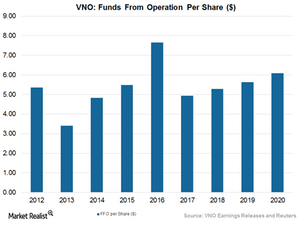Vornado Realty: A Commercial REIT Thriving amid a Retail Crisis
Vornado Realty Trust (VNO) is selling off its non-performing assets and focusing on its core business in a move to improve its profitability. Analysts are encouraged by Vornado’s strategy of optimizing its profits.
July 6 2017, Updated 7:39 a.m. ET

Commercial REITs
The commercial REIT sector is currently undergoing an important phase. On one hand, the pro-America stance taken by President Trump is raising the confidence of US consumers. Steady growth in the job market, along with lower inflation, has left greater disposable income in the hands of US consumers who can spend more on discretionary items.
On the other hand, the retail sector and malls are struggling against the trend toward online shopping. Retailers are resorting to closures as they are unable to maintain profits in the current scenario.
With respect to residential REITs, rent growth has moderated, However, this growth is at record highs, and residential apartment owners are making demographic shifts to high-demand Class A cities. Plus, the Federal Reserve’s recent policy of interest rate hikes has triggered uncertainty over the future of REITs.
The above-mentioned reasons have made investors jittery about the overall commercial REIT landscape. However, REITs like Vornado Realty Trust (VNO) have not been perturbed by the changing scenario. The company is strategically disposing of its underperforming assets and concentrating on its core business. It has made a demographic shift of its properties to Class A cities, which could help it drive higher revenues.
Bright prospects ahead
Vornado Realty Trust (VNO) is selling off its non-performing assets and focusing on its core business in a move to improve its profitability. Although this results in dilution of earnings and causes near-term headwinds, the strategy is expected to help the company gain momentum and grow in the long term.
Analysts are encouraged by Vornado’s strategy of optimizing its profits. According to analysts, Vornado is expected to witness a fall in its adjusted funds from operation (or AFFO) for 2Q17 and 3Q17 by 6.2% and 4.3%, respectively.
However, Vornado’s (VNO) profits are expected to turn around and embark on a growth trajectory from 4Q17 onward. VNO is expected to report growth of 5.9%, 3.5%, 11.3%, and 8.4% for 4Q17, 1Q18, 2Q18, and 3Q18, respectively.
How did Vornado start 2017?
Vornado Realty Trust’s (VNO) adjusted FFO for 1Q17 came in at $1.13 per share, compared to $1.05 per share in 1Q16. The upswing in profit was the result of its lower cost of operations and higher revenues.
Vornado’s FFO missed analysts’ estimates by 3.7%. However, its FFO came in 7.6% higher than in 1Q16.
Investors were encouraged by the company’s 1Q17 results. Its stock opened 1.1% higher on May 2, 2017, a day after earnings were released.
VNO’s peers
Vornado’s 2016 FFO came in at $8.26 per share. Among its close competitors, AvalonBay Communities (AVB), Equity Residential (EQR), and Boston Properties (BXP) reported FFO per share of $8.26, $6.03, and $13.02, respectively.
Vornado Realty Trust (VNO), Boston Properties, and Equity Residential comprise ~12.4% of the iShares Cohen & Steers REIT ETF (ICF). ICF’s portfolio is broadly diversified in terms of the portfolio, and it provides a cushion against industrial and macroeconomic headwinds and volatility.
In this series, we’ll look into VNO’s growth outlook, the effect of macroeconomic events, mergers and acquisitions, debt leverage capability, shareholder returns, and valuations.
